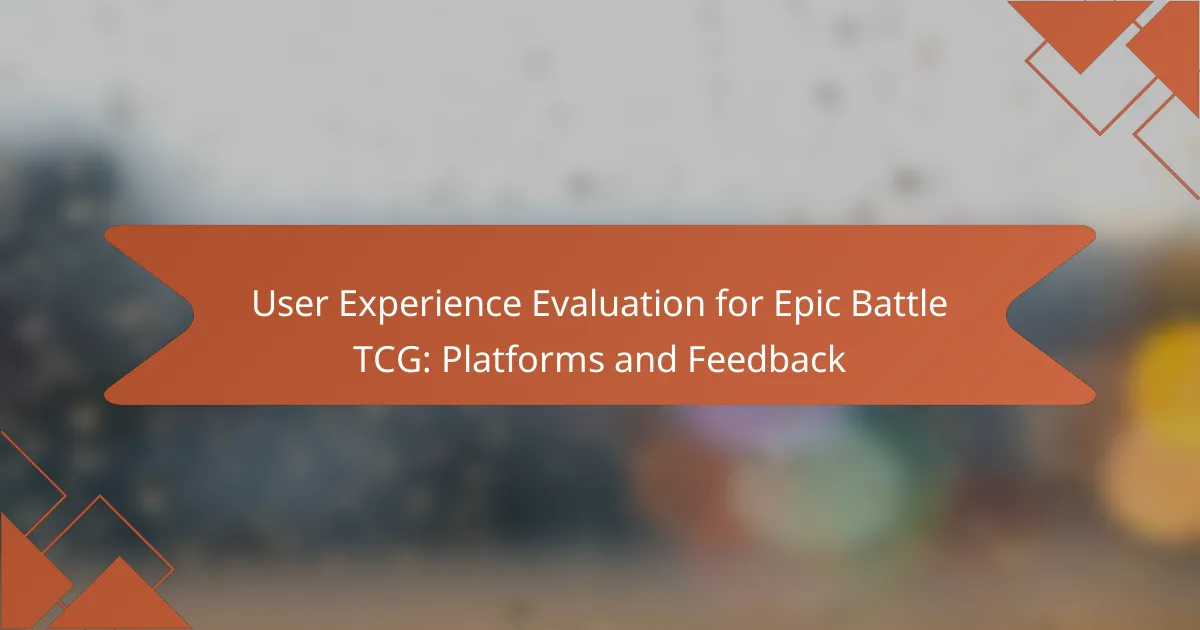Evaluating user experience for Epic Battle TCG is crucial for understanding player interactions and satisfaction. Key platforms such as Steam, Discord, and Reddit provide valuable feedback that can highlight the game’s strengths and areas for improvement. By analyzing player engagement and retention metrics, developers can refine the game to create a more enjoyable experience for all players.

What are the best platforms for evaluating user experience in Epic Battle TCG?
The best platforms for evaluating user experience in Epic Battle TCG include Steam user reviews, Discord community feedback, Reddit discussions, game forums analysis, and social media sentiment. Each platform offers unique insights that can help developers and players understand the game’s strengths and weaknesses.
Steam user reviews
Steam user reviews provide direct feedback from players who have engaged with Epic Battle TCG. These reviews often highlight specific gameplay elements, such as card balance and user interface, and can be filtered by recent or overall ratings to gauge current sentiment.
When analyzing Steam reviews, look for trends in feedback. For instance, if a significant number of players mention issues with matchmaking, it may indicate a need for improvements in that area. Pay attention to both positive and negative reviews to get a balanced perspective.
Discord community feedback
Discord communities dedicated to Epic Battle TCG are vibrant spaces for real-time discussions among players. Feedback shared here can be immediate and often includes suggestions for game improvements or features players wish to see.
Engaging with the community on Discord allows developers to ask specific questions and gather targeted feedback. Consider creating polls or discussion threads to facilitate focused conversations about user experience and potential enhancements.
Reddit discussions
Reddit serves as a platform for in-depth discussions about Epic Battle TCG, where players share their experiences and strategies. Subreddits related to the game can reveal common concerns and innovative strategies that enhance user experience.
When reviewing Reddit discussions, pay attention to upvoted posts and comments, as these often reflect the most relevant issues or ideas. Participating in these discussions can also help developers connect with the player base and clarify any misconceptions.
Game forums analysis
Game forums dedicated to Epic Battle TCG are valuable resources for detailed user feedback and analysis. Players often post comprehensive reviews, guides, and suggestions that can provide insights into the overall user experience.
To effectively analyze game forums, look for recurring themes in player posts. Creating a summary of common feedback can help identify areas for improvement and highlight features that are well-received by the community.
Social media sentiment
Social media platforms like Twitter and Facebook can be used to gauge public sentiment about Epic Battle TCG. Players often share their thoughts and experiences in real-time, allowing for a broader understanding of user opinions.
Monitor hashtags related to the game and engage with players to gather insights. Tools for social media analytics can help track sentiment trends over time, providing a clearer picture of how user experience evolves with updates and changes to the game.

How can player feedback improve Epic Battle TCG?
Player feedback is essential for enhancing Epic Battle TCG by identifying areas for improvement, refining the user interface, and ensuring balanced game mechanics. By actively listening to players, developers can make informed decisions that lead to a more enjoyable gaming experience.
Identifying gameplay issues
Gathering player feedback helps pinpoint specific gameplay issues that may hinder enjoyment. Players often report bugs, unbalanced cards, or frustrating mechanics that can detract from the overall experience.
To effectively identify these issues, developers should implement surveys, forums, and in-game feedback tools. Regularly reviewing this feedback allows for timely adjustments and enhances player satisfaction.
Enhancing user interface
Player feedback is crucial for refining the user interface (UI) of Epic Battle TCG. Users often provide insights on navigation difficulties, visual clutter, and overall accessibility, which can significantly impact their gaming experience.
Consider conducting usability tests with a diverse group of players to gather specific suggestions. Prioritize changes that streamline navigation and improve visual clarity, ensuring that new updates resonate with the community’s preferences.
Balancing game mechanics
Balancing game mechanics is vital for maintaining fairness and competitiveness in Epic Battle TCG. Player feedback can reveal which cards or strategies dominate gameplay, leading to an uneven experience for others.
To achieve balance, developers should analyze win rates and player strategies, adjusting card attributes or mechanics as necessary. Engaging players in discussions about potential changes can foster a sense of community and investment in the game’s evolution.

What metrics should be used for user experience evaluation?
User experience evaluation for Epic Battle TCG should focus on several key metrics that provide insights into player interactions and satisfaction. These metrics include player engagement rates, session duration, feedback response time, and retention rates, each offering valuable data to enhance the overall gaming experience.
Player engagement rates
Player engagement rates measure how actively players interact with the game over a specific period. This metric can be calculated by tracking the number of active players compared to total registered users, often expressed as a percentage. High engagement rates indicate that players find the game compelling and enjoyable.
To improve engagement, consider implementing features like daily challenges or rewards for consistent play. Monitoring engagement trends can help identify which game elements resonate most with players, allowing for targeted enhancements.
Session duration
Session duration refers to the average time players spend in a single gaming session. This metric is crucial as longer sessions typically suggest higher player satisfaction and immersion. Aim for session durations that fall within the range of 20 to 60 minutes, depending on the game’s complexity and content.
To optimize session duration, ensure that gameplay is engaging and that players have clear objectives. Avoid overwhelming players with excessive complexity at the start, as this can lead to shorter sessions and disengagement.
Feedback response time
Feedback response time measures how quickly the development team addresses player feedback and issues. A shorter response time can significantly enhance player trust and satisfaction. Aim to respond to player feedback within a few days, with resolutions for critical issues addressed even more swiftly.
Implementing a structured feedback system, such as surveys or forums, can streamline this process. Regularly updating players on the status of their feedback fosters a sense of community and encourages ongoing engagement.
Retention rates
Retention rates indicate the percentage of players who return to the game after their initial play. High retention rates are essential for the long-term success of Epic Battle TCG, as they reflect player satisfaction and loyalty. Aiming for retention rates above 40% after the first week is a good benchmark.
To boost retention, consider introducing new content regularly and maintaining communication with players through newsletters or in-game notifications. Analyzing why players leave can also provide insights into necessary improvements, helping to keep the player base engaged and returning.

What are the prerequisites for effective user experience evaluation?
Effective user experience evaluation requires a clear understanding of the target audience and well-defined evaluation goals. These prerequisites ensure that the evaluation process is focused, relevant, and actionable.
Understanding target audience
Knowing the target audience is crucial for tailoring the user experience evaluation to their specific needs and preferences. This involves identifying demographics such as age, interests, and gaming habits, which can influence how players interact with Epic Battle TCG.
Consider conducting surveys or interviews to gather insights directly from potential users. This qualitative data can help in creating user personas that represent different segments of your audience, allowing for more targeted evaluations.
Setting clear evaluation goals
Clear evaluation goals provide direction for the user experience assessment process. Goals should be specific, measurable, attainable, relevant, and time-bound (SMART), focusing on aspects like usability, engagement, and satisfaction with Epic Battle TCG.
For example, a goal might be to improve user retention by 15% over the next six months through enhanced gameplay mechanics. Establishing such goals helps in prioritizing evaluation activities and measuring success effectively.

How does user experience evaluation impact game development?
User experience evaluation is crucial for game development as it directly influences the design and functionality of a game. By understanding player interactions and preferences, developers can create a more engaging and enjoyable gaming experience.
Informs design decisions
User experience evaluation provides insights that shape design choices in Epic Battle TCG. By analyzing player feedback, developers can identify which features resonate well and which aspects may need refinement. This iterative process ensures that the game evolves in line with player expectations.
For example, if players consistently report difficulty navigating the game interface, developers can redesign it to enhance usability. Prioritizing intuitive design can lead to higher player satisfaction and retention rates.
Guides feature updates
User experience evaluation plays a key role in determining which features to update or introduce in Epic Battle TCG. Regular feedback from players helps developers prioritize updates that will have the most significant impact on gameplay and enjoyment.
For instance, if a majority of players express interest in new card types or mechanics, developers can focus on these areas for future updates. This targeted approach not only improves the game but also fosters a sense of community, as players feel their input is valued and acted upon.

What are the emerging trends in user experience evaluation for digital games?
Emerging trends in user experience evaluation for digital games focus on integrating advanced analytics, user feedback, and adaptive design principles. These trends aim to enhance player engagement and satisfaction by leveraging data-driven insights and real-time adjustments.
Incorporating Player Feedback
Incorporating player feedback is crucial for understanding user experience in digital games. Developers often utilize surveys, focus groups, and in-game feedback tools to gather insights directly from players. This feedback can guide design improvements and feature updates, ensuring that the game evolves in line with player expectations.
For instance, implementing a post-game survey can yield valuable data on player satisfaction and areas for improvement. Regularly analyzing this feedback helps developers prioritize changes that enhance the overall gaming experience.
Utilizing Data Analytics
Data analytics plays a significant role in evaluating user experience by tracking player behavior and engagement metrics. Developers can analyze data such as session length, in-game purchases, and drop-off rates to identify patterns that indicate user satisfaction or frustration. This information can inform design decisions and feature enhancements.
For example, if analytics show that players frequently abandon a game after a specific level, developers can investigate potential issues with difficulty or engagement at that point. Adjusting these elements can lead to improved retention rates.
Adaptive Design Principles
Adaptive design principles focus on creating flexible user interfaces that respond to player preferences and behaviors. This approach allows games to adjust difficulty levels, content delivery, and user interfaces based on individual player performance and feedback. Such customization can significantly enhance user satisfaction.
For instance, a game might offer a choice between casual and competitive modes, allowing players to select their preferred experience. This adaptability can cater to a broader audience, improving overall engagement and retention.
